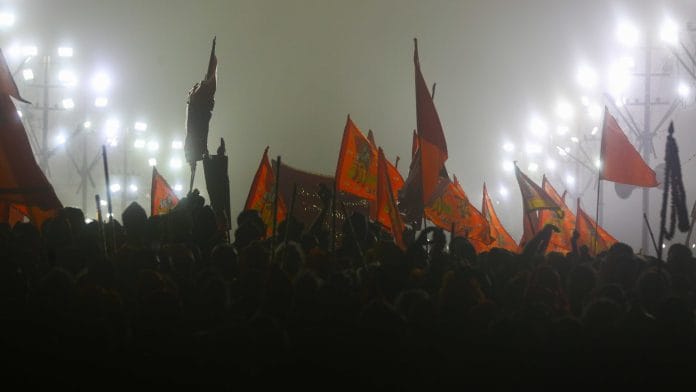The Maha Kumbh Mela, the world’s largest religious gathering and one of the most sacred pilgrimages for Hindus, is held once every 144 years and is currently taking place in Prayagraj, Uttar Pradesh. The sight of devotees marching toward the confluence of three rivers, Ganga, Yamuna, and the mythical Saraswati, is something to behold—barefoot pilgrims walking for miles, sadhus smeared in ash leading the way, families carrying their few belongings wrapped in cloth.
The air is thick with the sound of conch shells and chants, and the kind of raw energy at the Maha Kumbh Mela makes it clear that this isn’t just a gathering—it’s faith, devotion, where crores of people gather to take the holy dip and stay at the tent city spanning thousands of acres.
One of the biggest joys of growing up in India was experiencing its diversity of faith. As a Muslim, I understood the significance of the Hajj pilgrimage in our lives, but I also witnessed the deep devotion and emotions tied to Hindu pilgrimages. Witnessing their impact on people’s lives made me understand not just their religious significance, but also the emotions and sense of purpose they hold.
Why modern Indians critique the Kumbh Mela
The Kumbh Mela—a congregation for spiritual cleansing of the soul, where taking a dip in the holy waters is believed to wash away sins and bring people closer to the divine—is something that should stand beyond politics. But that’s not the reality, I can’t forget how, in 2001, former Congress president Sonia Gandhi’s Kumbh snan (holy bath) became more than just a religious act. It turned into a political spectacle.
Some saw it as her attempt to counter BJP’s brand of Hindu politics, while others thought it was a way to quiet the whispers about her foreign origins. And honestly, it hasn’t changed much today either. The sacredness of the Kumbh Mela, something so deeply rooted in faith and spirituality, still sometimes gets entangled in political narratives.
These things are not about Hindu-Muslim. These are about our origins, our country, and our civilisation. There is no Hindu or Muslim in this—if you believe you are Indian, then you should feel everything — Kabir Khan, filmmaker
While politicians doing this is something one can understand, what really catches my attention is the criticism Kumbh Mela faces from modern Indians. Complaints about mismanagement are one thing, but what stands out is the opposition to the event itself. From ‘safety issues’ to ‘wasteful spending’, and accusations of promoting superstition, the criticism often seems to go beyond practical concerns.
Some argue that we need to move forward, embracing innovation and technology, and leaving behind what they see as outdated traditions and practices. In this view, the Kumbh is positioned as a barrier to innovation and scientific progress, as if it’s something that must be discarded to make way for a “modern” India.
Also read: 12 hours after Maha Kumbh stampede, TV news back to ‘unshakeable faith, excellent arrangement’
Kumbh Mela: India’s living cultural legacy
The argument that the Kumbh Mela is a hindrance to progress is flawed on several levels. First, it overlooks the cultural and spiritual significance of the event, which is deeply woven into the fabric of millions of people’s lives. It is not just the history of Hindus, but also India. It’s a testament to the ability of ancient India to organise and plan such a vast event and carry forward the legacy.
What critics often overlook is that for millions of Hindus, the Kumbh Mela is not just a ritual but also a deeply spiritual experience that strengthens their connection with the divine. It is a moment of faith, where devotees come together, not just as individuals but as part of a vast global Hindu community, bound by shared beliefs and traditions.
Beyond the religious aspect, it is also a living testament to history—a tradition that has endured for centuries, shaping and being shaped by the evolving cultural and spiritual fabric of India. Dismissing the Kumbh Mela as outdated ignores the profound role it plays in people’s lives, offering them a sense of belonging, devotion, and continuity with their heritage. If anything, it’s a reminder that progress doesn’t always mean leaving behind what’s meaningful to a society—it can also mean evolving in a way that respects and celebrates the past as well.
Furthermore, while it’s about faith, it’s also about our civilisation. What makes this Kumbh Mela even more admirable for me is its inclusivity where anyone regardless of their identity can participate. As filmmaker Kabir Khan, who visited the Maha Kumbh Mela recently, said, “These things are not about Hindu-Muslim. These are about our origins, our country, and our civilisation. There is no Hindu or Muslim in this—if you believe you are Indian, then you should feel everything.”
Amana Begam Ansari is a columnist and TV news panelist. She runs a weekly YouTube show called ‘India This Week by Amana and Khalid’. She tweets @Amana_Ansari. Views are personal.
(Edited by Aamaan Alam Khan)







Desi Candace Owens, entire existence is being an Aunty Tom meant to pander the prejudices of a certain class of reader engaging in some of the lamest strawmanning straight out of a WhatsApp forward. I wonder if the author ever gets tired of the act, I suppose she’s being doing it so long that she now is a true believer. Who are we to stop a grift that keeps on giving.
First time I’ve heard a Muslim author encouraging identifying with the ancient civilisational heritage of Bharata.
There are a few people who don’t approve of the Modi dispensation on any count. There only reason for existence is to puncture it on drop of the hat. Their thought process is do clouded that they overlook what is simple common sense .